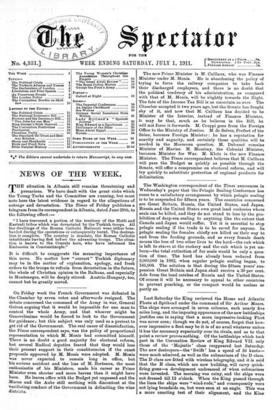The Washington correspondent of the Times announces in Wednesday's paper
that the Pelagic Sealing Conference has come to a satisfactory arrangement by which pelagic sealing is to be suspended for fifteen years. The countries concerned are Great Britain, Russia, the United States, and Japan. Russia and the United States own great laud rookeries where seals can be killed, and they do not stand to lose by the pro- hibition of deep-sea sealing to anything like the extent that Canada and Japan would suffer. Yet it is essential to stop pelagic sealing if the trade is to be saved for anyone. In pelagic sealing the females chiefly are killed on their way to and from the feeding grounds, and as every female death means the loss of two other lives to the herd—the cub which is left to starve at the rookery and the cub which is yet un- born—the total extinction of fur seals would be only a ques- tion of time. The herd has already been reduced from 2,000,000 in 1882, when regular pelagic sealing began, to 185,000. The solution is that during the fifteen years' sus- pension Great Britain and Japan shall receive a 30 per cent. dole from the land catches of Russia and the United States. Of course it will be necessary to appeal to other countries to prevent poaching, or the compact would be useless or partly so.














































 Previous page
Previous page